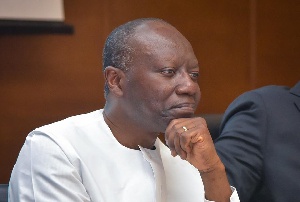Finance Minister Ken Ofori-Atta says in order for us to achieve the ‘Beyond Aid’ agenda there must be fundamental changes in attitudes based on some commitments and core values.
The minister who was speaking at the National Development Planning Commission’s Inaugural forum on the theme: "Ghana @100-An Agenda towards a solidly developed nation’’ said the Ghana Beyond Aid Charter, which was launched by the president, has outlined these core values.
He said patriotism, honesty, respect for each other, discipline, hard work, volunteerism, self reliance, wise and efficient use of Ghana’s resources and safeguarding the public purse, transparency and accountability, a Ghana free from all forms of corruption, equal opportunities for all Ghanaians regardless of gender, tribe or politics would help Ghana achieve the goal of beyond aid.
He also said strong support for the private sector for growth and job creation and collaboration among social partners particularly the labour, business and government for economic social development.
The charter is expected to present the meaning, purpose and the calendar of implementation that will allow Ghana to reach the goal of developing the country, not through dependence on aid from development partners, but through available natural resources.
The charter was drawn by a Committee Chaired by Senior Minister, Yaw Osafo-Maafo.The Committee was made up of persons from varying sectors of the governance structure, including the Minister for Finance, Ken Ofori-Atta; Minister for Employment and Labour Relations, Ignatius Baffour Awuah; Minister for Planning, Prof. Gyan Baffour; and the Minister for Local Government and Rural Development, Hajia Alima Mahama.
The rest were drawn from the Trades Union Congress, the Private Enterprise Foundation, the Ghana National Association of Teachers, as well as the Association of Ghana industries.
The Ghana we want he said was encapsulated in what he termed ‘’A Wiser Ghana’’.
To him, if we should commit to the charter and make them manifest in the way we brand our public and private institutions then ‘’I am confident that we can build much earlier before we turn 100 years’’, he said.
A wiser Ghana to him means a wealthy Ghana with a dynamic industrialized, technologically advanced and a prosperous economy enjoying an upper middle status.
The beyond aid agenda he added is one that is inclusive where everyone has access to equal opportunities to prepare us to benefit from the prosperous economy through productive employment.
On his part, the Board Chairman for the NDPC Prof. Stephen Adei underscored the need for the country to have a long-term development framework to guide us in achieving our short, medium and long-term plans.
Prof. Adei said countries with significant success in development and growth were those that had had long-term development perspectives and pursued them with consistency.
On Wednesday, May 29, the NDPC held a National Development Forum to engage the public on development policy and promote ownership and accountability for the implementation of national priorities.
The forum, on the theme: “Ghana@100: An Agenda Towards a Solidly Developed Nation,” was first the series of monthly engagements that would share information, generate and gather citizens feedback around developmental issues to inform policies.
Meanwhile, eight sessions of the fora had been programmed from this month to December, with the expectation of regular monthly dialogues next year.
Topics to be discussed in subsequent fora would include Human Capital Requirement for Development in Ghana; Attitudinal Change for National Development; Advancing a Gender-based Development Agenda; Food and Nutrition; The Future of Work-Wages, Productivity and Employment; and Sanitation and Pollution (Noise).
Other topics would be: Infrastructure and Development; Private Sector Development; Youth Development; Corruption and National Development; National Security; Climate Change: Impact, Risks and Vulnerability; Mobilising Financial Resources for Development: The State and Prospect of Development Financing in Ghana; and Tracking Ghana’s Progress Towards Attainment of the SDGs”.
Business News of Friday, 31 May 2019
Source: rainbowradioonline.com

















